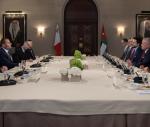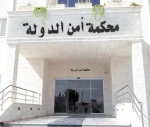You are here
Lebanese MPs fail to elect president for eighth time
By Reuters - Jul 02,2014 - Last updated at Jul 02,2014
BEIRUT — Lebanese lawmakers failed to elect a president on Wednesday, for the eighth time, to succeed Michel Sleiman whose term ended in May, prolonging a political vacuum as the country struggles with violence, economic decline and an influx of Syrian refugees.
The civil war in neighbouring Syria has aggravated long-standing rivalries in Lebanon, where political power is divided among religious communities — the presidency goes to a Maronite Christian, the parliament speaker is a Shiite Muslim and the prime minister a Sunni.
Parliament Speaker Nabih Berri said he would postpone a vote for a new president until July 23 because not enough parliamentarians turned up to the assembly on Wednesday. Political groups have boycotted sessions in recent weeks and blamed each other for the deadlock.
Some of Lebanon’s deepest political divisions come over the handling of the Syrian crisis, which has driven around 1 million refugees into Lebanon.
Politicians from the March 8 coalition, which includes Shiite Muslim group Hizbollah, support Syrian President Bashar Assad. The rival March 14 coalition backs Assad’s opponents.
The two blocs were formed after the assassination of former prime minister Rafik Hariri in 2005. March 14 accused Syria and Hizbollah of responsibility, a charge they deny.
Regional powerbrokers Saudi Arabia and Iran support March 14 and March 8 respectively, complicating efforts to agree on a presidential candidate.
The deadlock comes at a time of worsening security. Three suicide bomb attacks late last month targeted Beirut and a checkpoint on the road to Syria. The Syrian crisis and the political stalemate have also hit the Lebanese economy, prompting the central bank to introduce stimulus packages.
Prime Minister Tammam Salam’s government has taken over some presidential duties until a new president is chosen.
The presidency was once the leading political office in Lebanon, but that power was eroded under the agreement which ended the country’s civil war, handing greater influence to the government and prime minister.
Related Articles
Lebanese parliamentarians failed on Thursday in a last effort to elect a successor to President Michel Sleiman before his term expires, leaving a political vacuum as the country struggles to cope with spillover from Syria’s civil war.
A week ago, Lebanon was without a government and facing the prospect of an even deeper crisis come May, when President Michel Sleiman’s term was set to expire with no agreement on his replacement.
US Secretary of State John Kerry urged Lebanon’s politicians on Wednesday to overcome their “deeply troubling” stalemate and elect a new president to help respond to the damaging fallout of civil war in neighbouring Syria.















